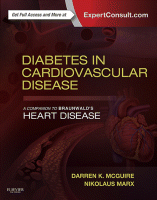Physical Address
304 North Cardinal St.
Dorchester Center, MA 02124

Patients with diabetes mellitus (DM) and acute coronary syndrome (ACS) are at particularly high risk for recurrent cardiovascular events and death. The reason for this increased risk is multifactorial, including a higher risk profile, higher platelet reactivity, and underuse of…

The observation that elevated glucose can occur in patients hospitalized with acute coronary syndromes (ACS; unstable angina, non–ST-segment elevation myocardial infarction [NSTEMI], and ST-segment elevation myocardial infarction [STEMI]) was made many decades ago. Since then, numerous studies have documented that…

Global Burden of Cardiovascular Disease and Diabetes Cardiovascular diseases are the number one cause of death worldwide. In 2008, approximately 17.3 million people died from cardiovascular disease, accounting for approximately one third of all deaths; an estimated 7.3 million were…

Diabetes mellitus is a major contributor to the development of cardiovascular illness and results in a twofold to fourfold increase in coronary artery disease (see also Chapter 7 ). It accounts for approximately one fourth of all patients who undergo…

Diabetes mellitus is a major risk factor for cardiovascular disease affecting multiple vascular territories. At the cardiac level, it is associated with a risk of coronary artery disease (CAD) equivalent to 15 years of ageing. Although coronary revascularization has definitively…

Platelets play a central role in the pathobiology of atherogenesis and atherothrombosis. Therefore therapies that are directed toward platelet inhibition are widely used in patients with established coronary heart disease (CHD) or in moderate- to high-risk individuals for primary prevention…

Overview This chapter describes strategies for and effects of therapeutic lifestyle changes and/or pharmacologic interventions with lipid-lowering medications on coronary heart disease (CHD) risk in patients with diabetes mellitus (DM), focusing on the most recent data from randomized clinical trials…

The effects of aggressive blood pressure (BP) management on the risks of coronary heart disease (CHD) and other vascular outcomes among individuals with type 2 diabetes mellitus (T2DM) has been a matter of intense debate recently, with the results of…

Coronary heart disease (CHD) is the most common vascular complication of diabetes. Because elevated glucose defines diabetes and because diabetes is a well-recognized risk factor for CHD, strategies that lower glucose should theoretically reduce the risk of CHD events in…

In the United States, the prevalence of high cholesterol, hypertension, and cigarette smoking together with age-adjusted cardiovascular deaths has declined over the last several decades. On the other hand, the prevalence of diabetes has risen steadily, largely because of an…